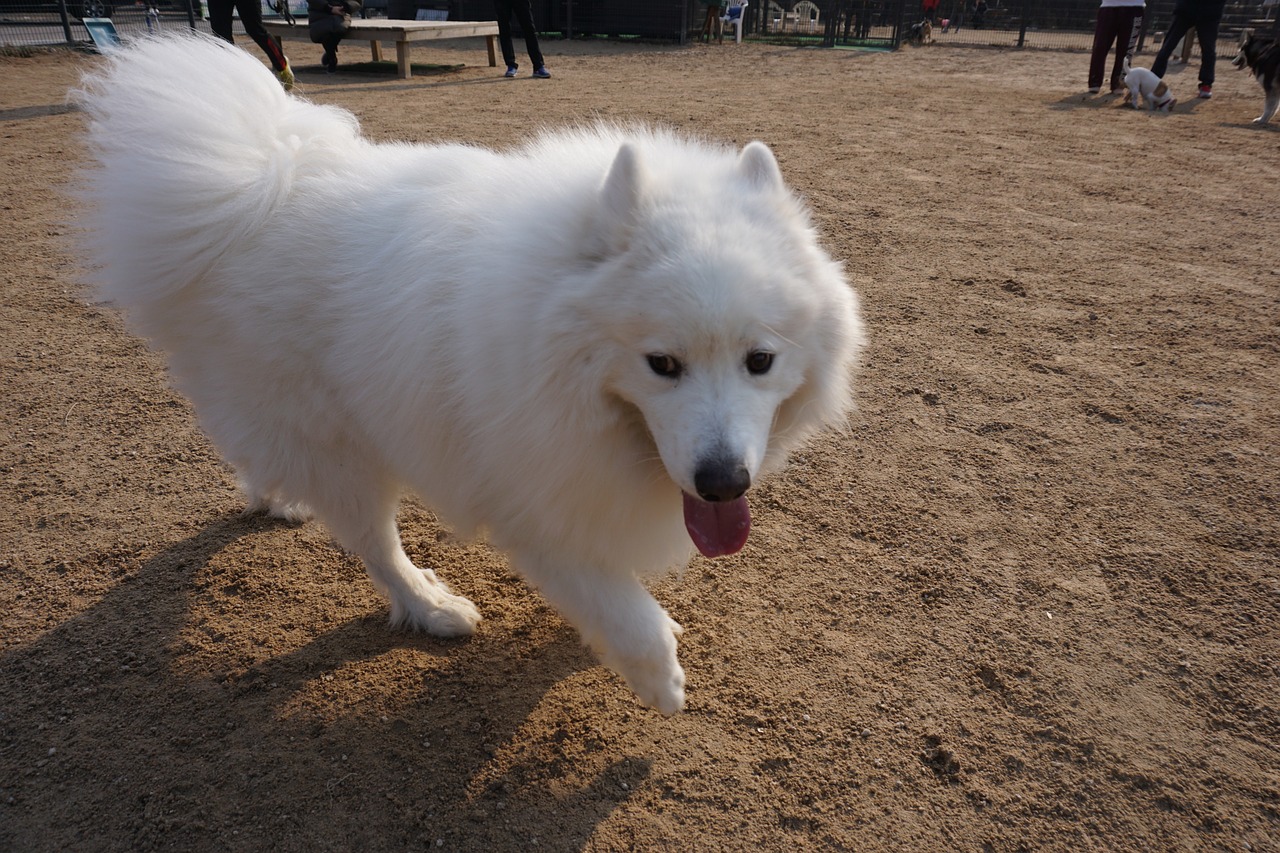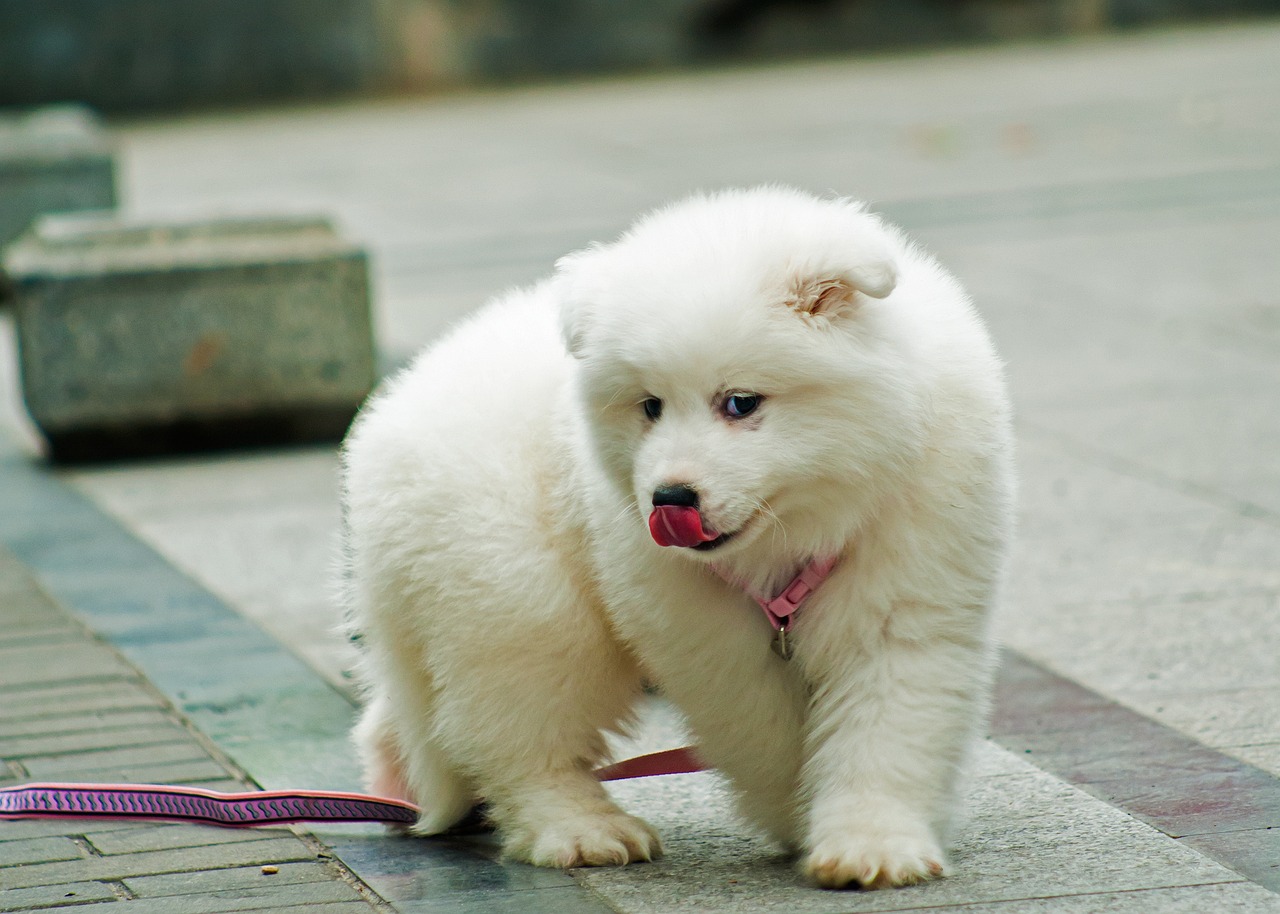The Samoyed, with its striking white coat, captivating smile, and expressive eyes, is not only one of the most visually appealing breeds but also has a personality that can melt hearts. Often referred to as the “smiling Sammie,” this breed has a rich history that’s deeply interwoven with the Samoyedic peoples of Siberia. But what truly sets the Samoyed apart is its distinctive temperament and personality. Let’s delve deep into the heart and soul of the Samoyed.
1. Friendly and Sociable
Samoyeds are renowned for their friendly disposition. They are rarely aggressive and tend to be open-hearted, even with strangers. Their sociable nature, however, means they’re not particularly well-suited for guard dog duties – a Samoyed is more likely to welcome an intruder with a wagging tail than a growl.
2. Adaptable Companions
While they have a history of surviving in cold climates, Samoyeds are adaptable. They enjoy playing in the snow, but with proper care and attention, they can adjust to warmer climates as well. Their true need is for companionship and being involved in family activities.
3. Energetic and Playful
The Samoyed’s working origins mean it possesses a reservoir of energy. They love play sessions, long walks, and even enjoy dog sports like agility or herding trials. A bored Samoyed can become mischievous, so it’s vital to keep them mentally and physically engaged.
4. Intelligent but Stubborn
Samoyeds are undoubtedly smart, but they also have a streak of independence. They can be stubborn at times, which can make training a challenge. However, with consistent training methods rooted in positive reinforcement, they can be taught a wide array of commands and tricks.
5. Vocal Communicators
If a Samoyed wants to tell you something, they won’t hold back. They are known to “talk” with a series of barks, howls, and very unique “Sammie sounds” that can be quite amusing. Early training can help manage excessive barking.
6. Affectionate Family Members
A Samoyed is not a dog that can be left alone in the backyard. They crave human attention and interaction. They are incredibly affectionate with their families, often shadowing their favorite person from room to room. Their gentle disposition also makes them excellent companions for children.
7. Compatible with Other Pets
While they have a hunting history, most Samoyeds are amicable with other dogs and pets. Early socialization can further ensure that they cohabit harmoniously with other household animals.
8. Independent Thinkers
Though eager to please, Samoyeds are independent thinkers. Sometimes, they might weigh the pros and cons before obeying a command, especially if they don’t see a good reason to comply.
9. Majestic but Maintenance-Intensive
That glorious white coat doesn’t maintain itself. Regular grooming is a must to prevent matting and tangling, especially during the shedding seasons. On the plus side, their coats have a unique texture that repels dirt.
The Samoyed is a blend of contrasts: they are hard workers but also love leisure, they are independent yet crave companionship, and they are playful but can be profoundly serene. Their multifaceted personality makes them suitable for various lifestyles, from active individuals to families with children.
How Does a Male Samoyed Temperament Compare to a Female Samoyed?
Male Samoyeds Temperament:
1. Size and Presence
Male Samoyeds are generally larger and have a more commanding presence than their female counterparts. This size difference can sometimes be mistaken for dominance or a more assertive demeanor, but this isn’t always the case.
2. Territorial Instincts
Males, especially those that aren’t neutered, can exhibit more territorial behaviors. This might include marking or being more protective of their living space, toys, or family members.
3. Stubborn Streak
While both genders exhibit the breed’s typical independent nature, male Samoyeds can sometimes be more headstrong during training sessions. Consistent training from a young age can help mitigate this.
4. Affectionate and Clingy
Many Samoyed owners have observed that their male dogs tend to be more affectionate, often seeking out attention and physical closeness more frequently. They can be quite “clingy” with their owners, always wanting to be by their side.
5. Playfulness
Males generally remain playful and puppy-like for a more extended period in their lives compared to females. They might be more energetic during play sessions and take a bit longer to “mature.”
Female Samoyeds Temperament:
1. Size and Demeanor
Females are typically smaller than males, giving them a slightly less imposing appearance. This can sometimes lead to people perceiving them as being more approachable or gentler, though this isn’t always the case.
2. Independent Nature
While both genders are known for their independence, female Samoyeds are often seen as more self-sufficient. They might be content spending time on their own and may not always seek out attention as actively as males.
3. Mood Fluctuations
Female Samoyeds, especially if they aren’t spayed, can have mood fluctuations based on their heat cycle. During these times, they might become more aloof or irritable.
4. Quick Learners
Many owners have observed that female Samoyeds can be quicker learners during training sessions. They often appear more focused and might pick up new commands with less repetition.
5. Mothering Instinct
Even if they’ve never had puppies, female Samoyeds sometimes exhibit a mothering instinct. This can be seen in their interactions with smaller animals or even toys, treating them with gentle care.
It’s crucial to note that while these general tendencies can be observed in many Samoyeds, individual dogs will always have their unique personalities. Factors like upbringing, training, socialization, and life experiences play a significant role in shaping a dog’s temperament.
Frequently Asked Questions about Samoyed Temperament and Personality

1. What is the typical temperament of a Samoyed?
Samoyeds are known for their friendly, gentle, and sociable nature. They’re often called “smiling Sammies” due to their characteristic “smile.” Their disposition is generally very approachable and they’re seldom aggressive.
2. Are Samoyeds good with children?
Yes, Samoyeds are typically excellent with children. Their gentle and playful nature makes them suitable companions for kids. However, as with all breeds, it’s essential to supervise interactions between dogs and young children.
3. How do Samoyeds get along with other pets?
Samoyeds are usually good with other pets, especially if they are socialized early on. However, due to their history as reindeer herders, they may have a chasing instinct, so it’s essential to be cautious when introducing them to small animals.
4. Are Samoyeds easy to train?
While intelligent and eager to please, Samoyeds have an independent streak, which can make them somewhat stubborn. Consistent training and early socialization are key to raising a well-behaved Samoyed.
5. Do Samoyeds bark a lot?
Samoyeds can be quite vocal, often expressing themselves with barks, howls, and “talking.” They may bark when they’re bored, seeking attention, or alerting you to something in their environment.
6. Are Samoyeds suitable for apartment living?
Though adaptable, Samoyeds are active dogs with high energy levels. They can live in an apartment if provided with enough exercise, but they’ll thrive best with access to a yard.
7. How much exercise does a Samoyed need?
Samoyeds require regular exercise to keep them healthy and happy. Daily walks, play sessions, and occasional hikes or dog sports are recommended to burn off their energy.
8. Is the Samoyed a dominant breed?
While not inherently dominant, Samoyeds have a strong-willed and independent nature. It’s crucial to establish leadership and set boundaries early on.
9. Are Samoyeds known to be destructive?
If left alone for extended periods or not given enough mental and physical stimulation, Samoyeds can become bored and exhibit destructive behaviors like chewing or digging.
10. How are Samoyeds in cold weather?
Samoyeds thrive in cold weather due to their thick double coat, which was developed to withstand frigid Arctic temperatures. They love snow and can spend extended periods outside in the cold.
11. Do Samoyeds suffer from separation anxiety?
Samoyeds are very social and can develop separation anxiety if left alone for too long. It’s important to train them gradually to tolerate alone time.
12. Are Samoyeds good guard dogs?
While they can be alert and will often bark at strangers approaching their territory, Samoyeds are typically too friendly to be effective guard dogs.
13. Do Samoyeds like to swim?
Some Samoyeds enjoy water and swimming, while others might be hesitant. Always introduce water activities slowly and ensure safety when near bodies of water.
14. Are Samoyeds hypoallergenic?
No dog is entirely hypoallergenic, but Samoyeds do produce less dander than many other breeds. However, they shed heavily, which can be an issue for allergy sufferers.
15. How often do Samoyeds need grooming?
Samoyeds have a thick double coat that requires regular grooming. Brushing several times a week, and even daily during shedding seasons, is essential to prevent matting and to keep their coat healthy.
What Kind of Person Is a Good Fit for a Samoyed?

Samoyeds, with their glistening white coats, iconic “Sammy smile,” and effervescent personality, can quickly capture the heart of any dog lover. However, these northern dogs, originally bred to herd and pull sleds in Siberia’s frigid temperatures, have specific needs and temperaments. Here’s a look into the type of person best suited for sharing their life with a Samoyed:
1. Active Individuals or Families
Samoyeds have a high energy level. People who enjoy outdoor activities, such as hiking, jogging, or playing in the snow, will find the Samoyed an enthusiastic companion. They thrive when involved in family activities and enjoy physical games and challenges.
2. Patient and Consistent Trainers
While Samoyeds are intelligent, they have an independent streak, which can sometimes be mistaken for stubbornness. Those willing to invest time in training, using positive reinforcement methods, will find success. Consistency is key with this breed.
3. Dedicated Groomers
The luxurious white coat of the Samoyed is stunning but requires regular maintenance. People ready to commit to frequent brushing and periodic professional grooming are ideal. This is especially true during their shedding seasons when they “blow” their undercoat.
4. Social Butterflies
Samoyeds are exceptionally social creatures. They thrive on interaction and don’t like being left alone for extended periods. Individuals who often entertain or have large families, allowing the dog to be amidst friendly faces, will have a happier Samoyed.
5. Allergy Sufferers (with a caveat)
While no dog is entirely hypoallergenic, Samoyeds produce less skin dander than many breeds. However, they do shed profusely. Someone with mild allergies who’s diligent about grooming and house cleaning might fare well with a Samoyed.
6. Space Enthusiasts
While adaptable to various living conditions, Samoyeds appreciate space. A home with a yard where they can romp and play is ideal. However, with sufficient daily exercise, they can adapt to apartment living.
7. Cold Climate Dwellers
Given their thick double coat, Samoyeds excel in colder climates. They can become uncomfortable in high heat. Those living in cooler regions, or those willing to provide their Samoyed with air-conditioned comfort during hot months, are a good match.
8. Lovers of Vocal Breeds
Samoyeds “talk.” They have a range of vocalizations from barks to howls to “conversations.” People who don’t mind a dog that often vocalizes its feelings and observations will appreciate the Samoyed’s communicative nature.
Samoyed’s friendly and loving demeanor can be a fit for many, the ideal Samoyed owner is someone who embraces an active lifestyle, values consistent training, enjoys regular grooming sessions, and cherishes the unique quirks of this Arctic breed.
 Toledo, United States.
Toledo, United States.